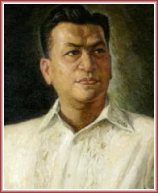
|
Philippines, 04 Mar 2026 |
Home >> News |
 |
||||
|
|
|
|
President Ramon Magsaysay remembered By Eddie Alinea PhilBoxing.com Sat, 29 Dec 2018  Sixty five years ago today, on December 30, 1953, Ramon Magsaysay became the 7th President of the Philippines. Magsaysay, ?Monching? to relatives and friends, ?My Guy? and ?Man of the Masses? to the Filipino electorate, was elected as the country?s Head State in the political exercise held November that year, beating incumbent Elpidio Quirino. The ?Guy? was sworn into office wearing the Barong Tagalog, a first for a Philippine Chief Executive, in what signaled what kind of government he will be doing on his way to earning the distinction as ?The Best President? the country ever had. Magsaysay's administration was considered one of the cleanest and most corruption-free in modern Philippines history; the period of his presidency is often cited as the Philippines's "Golden Years". Trade and industry flourished, the Philippine military was at its prime, and the country gained international recognition in sports, culture, and foreign affairs. The Philippines placed second on a ranking of Asia's clean and well-governed countries. In sports, the Philippines was, likewise, ranked second to the then powerhouse Japan in the Asian Games, the second edition of which was held in Manila where the Filipino contingent finished runnerup in the overall medal standing with 14-14-17 gold-silver-bronze medal harvest, our richest haul in the quadrennial conclave also known as the ?Olympic Games? of Asia. The preparations undertaken and presided over by the former automobile mechanic, congressman of his province Zambales, and Secretary of National Defense, among other government offices Magsaysay held before becoming President, earned the hosting the best Asiad in those times besides cementing the Filipinos? world famous hospitality. In these times when the Philippines is hard-pressed in even qualifying for the FIBA World Basketball Cup, it is but timely to remind those still not in the know that the Filipino cagers were already permanent fixtures of that global event and had, in fact, finished third, still the highest among Asians to this day in its 1954 edition held in Rio de Janeiro in Brazil. And that very memorable moment in the history of Philippine basketball and Philippine sports, for that matter, couldn?t have happened had it not for the intercession of President Magsaysay. And that our own Carlos ?The Geat Difference? Loyzaga would not have been named to the World Mythical Five, again, a first for an Asian. That team left Manila for the United States where the Filipinos were scheduled to play several tune up games at the date of departure without team captain Lauro ?The Fox? Mumar in what led the Philippine Amateur Athletic Federation, then the governing body in PH sports to ban him for life for ?failing to honor an international commitment and conduct unbecoming of an athlete of national stature.? The late Arsenio Lacson, former Manila Mayor and a Congressman at that time, denounced on the floor of the Lower House what he termed as the "oppression of the oppressed? on Mumar by the high lords of basketball. And filed a motion for investigation. The late sportswriter Eddie Ticzon, then writing for the Roces family-owned The Manila Times, reported on the ?missing Fox? whose only crime, he said, ?was his having been poor, unlike the other members of the basketball aristocracy.? Magsaysay, also known as the champion of the poor, made his move, held his own investigation and summoned the team captain to Malaca?ang twice where he told the President he promised basketball officials that he?d just follow as soon as the money his parents was supposed to send arrives. ?But nobody simply cared to listen. They suspended me without due process.? Convinced, President Magsaysay ordered the PAAF high priests, who, in a subsequent public hearing held at the Manila Hotel, lifted the ban it had earlier meted out on Mumar. The sports public, elated by the development, conducted a fund-raising campaign to raise funds for Mumar?s trip to the U.S. to join his teammates who at that time, had lost three of their first six build up games in the land of sweet and honey. After everything had been settled and having the needed money in his pocket at last, Mumar left for Florida with more well-wishers on hand than when the national team itself flew out of Manila. After a three-day rest with friends in Florida, Mumar along with his teammates?Carlos Loyzaga, Pons Saldana, Mariano Tolentino, Antonio Genato, Francisco Rabat, Rafael Barredo, Bayani Amador, Ramon Manulat, Nap Flores, Ben Francisco and coach Herminio ?Herr? Silva?flew to Cuba for a one-game exhibition with the Cuban national team. Lending his experience and leadership, Mumar, whose basketball career was nearly jeopardized by the fiasco, led the Philippines to a 49-45 victory over the Cubans in a triumph described by the Cuban media as a ?humiliation by a crew of ?little-known Asians.? That defeat to the ?Little Brown Dolls? resulted in the Cuban government?s decision not to send the team to the world championship. Mumar, Loyzaga, who was named to the world mythical five after the tournament, and their teammates compiled a 6-2 win-loss record, beaten only by eventual champion U.S. and runner up Brazil, to bring home the bronze medal for finishing third, the still the highest finish by any Asian country up to the present day. Click here to view a list of other articles written by Eddie Alinea. |
|
|
PhilBoxing.com has been created to support every aspiring Filipino boxer and the Philippine boxing scene in general. Please send comments to feedback@philboxing.com |
PRIVATE POLICY | LEGAL DISCLAIMER
developed and maintained by dong secuya © 2026 philboxing.com. |